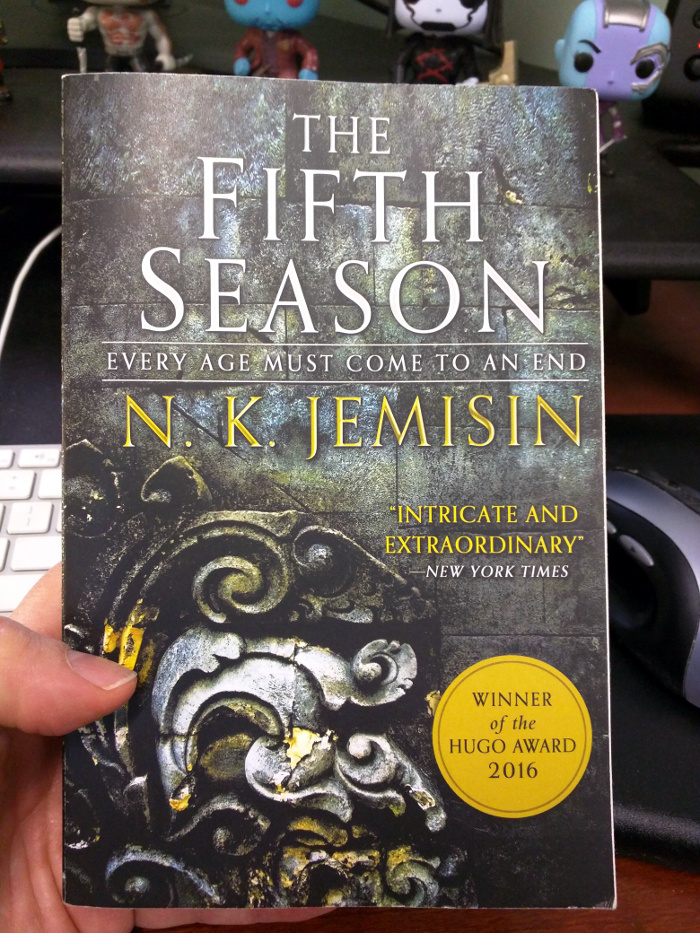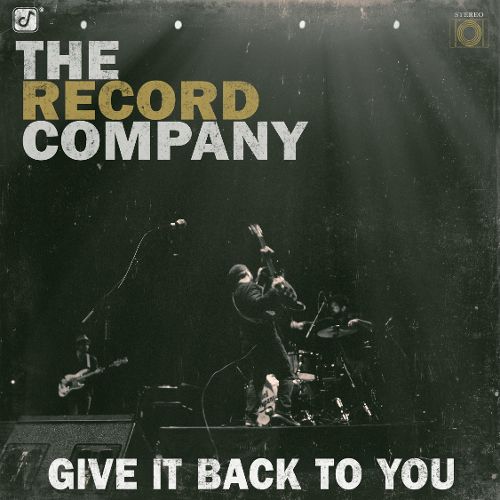I live on a farm, and a lot of my spare time is spent simply maintaining the property. When we moved out there so many years ago, I had grand plans for all of the land: an orchard over here, a hedge maze over there, and wonderful garden near the kitchen.
Then reality set in and it’s all I can do to keep the place from getting overrun with weeds. Luckily, nature gives me a bit of a respite with winter, but now that it is over I can look forward to the majority of my weekends being taken up outside. Not that I really mind, to be honest, but it doesn’t leave a tremendous amount of time for other pursuits I love, such as reading.
Last weekend was an exception. I decided to spend it reading (and watching NCAA basketball, but that’s church) and managed to read two really good novels.
One, The Fifth Season I have already reviewed, which was loaned to me by Ben. The second was The Collapsing Empire by John Scalzi.
I picked this book up last week at Flyleaf Books in Chapel Hill where Scalzi was appearing on a book tour promoting the novel. If you bought a copy there you could get it signed, so I went, along with Ben and his bride Cynthia.
If you get a chance to see Scalzi speak, I highly recommend it (here is a link to his tour dates). He does a really good job and I found the hour entertaining. He moved the talk along without ignoring the audience, which was loaded with your usual assortment of Sci-Fi nerds and people who just love books (for example, a group of us. some strangers, played the mobile version of Exploding Kittens on our phones while waiting for the talk to begin).
Afterward, we lined up for a few minutes with the man himself. Ben and Cynthia are “Sea Monkeys”, otherwise known as people who take the annual JoCo Cruise, and they had seen Scalzi speak a month ago on the boat. They were ahead of me in the signing line and bonded a bit with Scalzi over that shared experience.
Everyone who knows me knows I love to talk, especially with interesting people, but I knew I wouldn’t have much time with him. I did want to talk about something cool, and I brought up a memory triggered by his talk.
He didn’t read from The Collapsing Empire, instead he talked about the upcoming book in his Lock In series. In that universe, 1% of the world’s population suffers from a condition known as “Lock In” when they are fully awake yet fully paralyzed (similar to the end-stage effects of Lou Gehrig’s disease and other causes of Locked-in Syndrome). Technology comes to the rescue allowing those who suffer from this condition to pilot and interact through android bodies, called “Threeps” after the character C-3PO.
I got to thinking about what it would be like to interact with one or more people in such a body, and it reminded me of an incident that happened with our telepresence robot at the office. We have a device made by Double Robotics that you can think of as an iPad on a Segway. People can connect to it and drive it around. At my office we have a number of people who work remotely, some in other countries, so we got this robot to make it easier for them to feel part of the team.
One time I knew that Ronny, who lives in Germany, was on the robot talking to Jessica (our graphic designer) in her office about a new web site design. Even though I communicate with him often via instant messenger or a Hangout, when I realized I needed to ask him a question I unconsciously got up, left my office and went to talk with him in her office. It only struck me how odd that was after I returned to my desk and noticed my chat window. Thus, I think it would be very easy for such androids to assimilate into our culture without some sort of Future Shock.
We chatted about this for a minute, and then I offered my hand for a handshake. I immediately felt foolish, because I know a number of people who interact with lots of strangers tend to shy away from contact, but he shook my hand without hesitation. I did notice him grab the Purell right afterward and had to laugh. I like to think I’m on the high end of the geek hygiene scale but having suffered for nearly two months with some crud I picked up in Brussels at FOSDEM, I totally understood.
Anyway, back to the book. I always like to stress that I am not a professional book reviewer (I write these more to capture my own thoughts than for general consumption) and I try to stay away from spoilers. This is easier with a book I like, like this one, so minimal spoilers ahead but if you are sensitive to such things don’t continue on. If you want better reviews, check out Goodreads.

The first thing I noticed about the novel is that it felt slim. At 329 pages it was a lot smaller than the last two speculative fiction (SF) novels I read (The Fifth Season at 512 pages and Babylon’s Ashes at 544 pages). But then Neil Gaiman’s The Ocean at the End of the Lane was a scant 181 pages. Scalzi even addressed this on his blog, and from my own experience it read like a novel so no complaints there.
For some reason SF stories tend to span multiple volumes. Since I fully understand the author’s need to eat I know why they are released over time, but it can be frustrating for the fan. Some of my favorite authors are also notoriously slow writers. In some cases it doesn’t matter. For example, Neal Stephenson puts out huge books but for the most part they stand alone (the Baroque Cycle being the exception). I know as a reader that once I get to the end of it there will be some sense of closure. Other authors tell epic stories that don’t end with that last page, and it can be a bit frustrating waiting for the next part of the tale. Now I’m not one of those fans who are all “Write me a book, bitch,” it is art after all and art doesn’t follow schedules or deadlines, but I understand the sentiment.
My point (and yes, there is a point here) is that I really don’t care about the length of a book as long as the story is solid, and I don’t care if it spans multiple volumes as long as those come out on a regular basis. The two authors I mentioned above, Jemisin and Corey, are pretty good about releasing a new book once a year, and that once every one or two years works for me. I read so much that if it goes on much past that I end up having to re-read the original books, and quite often I don’t have the time.
Scalzi is pretty good about his output, although he did mention in the “Acknowledgments” that he was frustrated by the time it took to finish The Collapsing Empire.
Yes, there is a book review in here somewhere. I’m getting to it.
The Collapsing Empire takes place several centuries in the future of the Earth, and humankind has spread out to other star systems. One thing that all SF writers who include interstellar travel have to deal with is that pesky issue of the speed of light.
In our current understanding of the universe, nothing can travel faster than the speed of light. As one approaches the speed of light, time, length and momentum change by an amount called the Lorentz factor, often represented by the variable gamma. Here is an equation for gamma:

Note that it looks kind of scary, but it becomes much easier if you represent velocity, v, as a percentage of the speed of light.
For example, at one-tenth the speed of light, 0.10c or roughly 30,000 km/s, the denominator becomes the square root of (1 – 0.01) or 0.99499 which divided into one results in a gamma of 1.005. This means that at one-tenth the speed of light, time will appear to be half a percent slower, length will appear half a percent shorter and momentum will be half a percent greater.
Just to note that one of the fastest things I know about, the Voyager 1 spacecraft, is only moving about 17 km/sec, and if you plug that into the gamma equation the difference is negligible. This is why Newtonian physics gets the job done in most situations.
As you get closer to the speed of light, gamma gets larger. At 0.9c gamma is 2.29 and at 0.999c it’s 22.4. At the speed of light the denominator becomes 0 so gamma becomes infinite. This demonstrates why faster than light travel is not possible. With a Lorentz factor of near infinity it would take an infinite amount of energy to go faster.
Note that the speed of light is a limit with the caveat “for now”. The light speed limitation applies to everything, including information, but there is some evidence that it may be possible to send information faster than the speed of light.
Anyway, since the nearest star to Earth, the red dwarf Proxima Centauri, is 4.25 light years away, interstellar travel is problematic. Let’s say the bad guy in the story hops in his starship, cranks it up to a whopping one-tenth the speed of light, and heads out for the nearest star. The plot would have to pick up with his offspring something like 40 years into the future, assuming they survive. Not very exciting.
So it is up to SF authors to come up with some way around this speed limit. In Star Trek it was “warp speed” and in Star Wars it was “hyperspace”. In the past Scalzi came up with a rather unique way of addressing this by using multiple universes. In quantum theory, at microscopic levels it becomes impossible to know the exact location and the exact momentum of a particle at the same time. Thus the particle’s state is defined by a series of possibilities, describe by something called a “wave function”. When a measurement is made, the wave function is said to collapse into one of the possible states. One interpretation of this is that there are actually an infinite number of universes, real close to one another and representing all possibilities, and when the wave function collapses it is our consciousness, through the measurement, deciding in which one it wants to be.
Pretty heady stuff.
In Scalzi’s system, the way to travel to another star is to simply pick the alternative universe that is the same in every way as the one you are in, with the exception that you are there and not here.
While it is dangerous to apply quantum theory to macroscopic things, such as a cat, I thought Scalzi’s use of it was pretty original and cool.
With that prologue (sigh) let’s get back to The Collapsing Empire. In this universe Scalzi invents a new method for faster than light travel. Humans have discovered a part of the physical world called “The Flow”. It is, to paraphrase Ted Stevens, quite literally a series of (one way) tubes. While the physics of The Flow is pretty abstract (and not really relevant to the story), ships are able to enter a particular Flow at an entry point called a Shoal. Then, after some amount of time, they will exit the Flow at some distant location. This has enabled humans to colonize a number of star systems, although for the most part the places they live are underground in constructed habitats, as Earth-like worlds are hard to come by.
The main seat of civilization is one such habitat called The Hub, because it is located near a large number of entry and exit points to various Flows. Travel within a flow is not instantaneous, and the farthest system, End, is over nine months of Flow travel away from Hub.
The actual physics of The Flow is unimportant because this story is much more about plotting and intrigue than space travel. With all of these far-flung outposts of humanity, society had to be structured in such a way that they didn’t go to war with each other. The solution chosen was called the Interdependency. Resources were parceled out under control of guilds, which in turn were controlled by dynastic houses. Guilds received a monopoly on various products, and since these were scattered out among the various habitats it required them to work together in order to survive. One such house, the House of Wu, was powerful enough to install an emperor, called in the book by the gender-neutral term emperox, who stands at the top of society’s hierarchy.
The book takes place when two big events are happening to the Interdependency. One is that the emperox is dying, and we pick up with the first days of the new emperox. The second is that The Flow, which was considered stable, is now entering a time of great flux. In a very short period of time these “tubes” between various outposts of humanity are going to close forever, and thus the Interdependency is about to collapse. In fact, the Flow to (and I assume, from) Earth disappeared centuries earlier, as did one to another settlement, but those were considered outliers to The Flow’s innate stability.
Against this backdrop we get a healthy dose of court politics and backstabbing. Certain parties have more accurate information than others, and since these changes to The Flow mean, basically, the Interdependency is finished, people are angling to be in the best position when it goes away. As usual in such situations, some people are more concerned for their own well-being than those of society as a whole. It is a lot of fun to uncover the various plots and to see just how far people are willing to go to achieve their ambitions.
One of the coolest things he introduces is a perk of being an emperox. An interface is inserted into your neck which then records everything you think and experience. When you die this information is added to the “Memory Room” where the next emperox can come in and talk to those who held the position in the past. Scalzi makes use of this throughout the story, but what I liked about it is that the constructs of those who were emperox in the past are without ego, so they talk without any filters. I think it would be so interesting to be able to talk with certain people who lived in the past and get access to their unvarnished thoughts.
All of this is done in the prose for which Scalzi is known. I had to look up some new words, such as “squicked”, and toward the end he refers to one house as the House of Jemisin, which is an obvious nod to the author N.K. Jemisin.
It was a fun read, and I really look forward to the rest of the series. It looks like his next book, Head On will continue the story started in Lock In so I guess we can expect the next one in this series, The Last Emperox in late 2018 or early 2019. Despite that, I wouldn’t wait to read The Collapsing Empire, as it is really good on its own.



